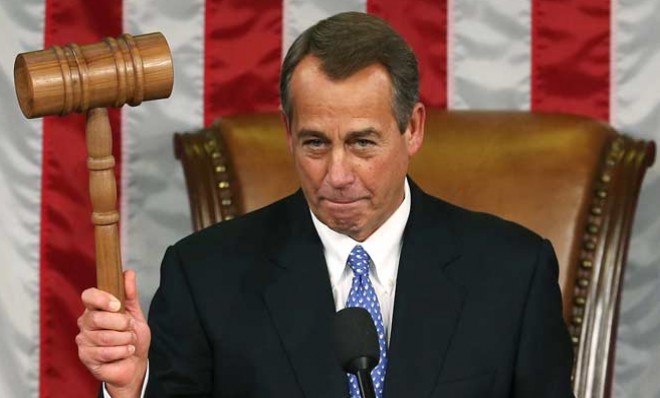Why the House stuck with Boehner
It's because he stuck with them


A House Republican conference on the brink of revolt a few days ago handily re-elected John Boehner to be their leader today, and from one perspective, that's a curiosity. What have Republicans won with Boehner as their leader? Not a popularity contest. Not the budget battle. Not much leverage to use in further fights with President Obama. He is not a party leader who is universally beloved by the GOP think tank/talk radio activist class (although GOP leaders rarely are). He is not even someone (unlike Speaker Dennis Hastert) who refused to bring a bill to the floor unless it had the majority of the majority (i.e, a majority of Republicans) supporting it.
For one thing: Who else is there?
Eric Cantor: He is not as beloved a figure in the conference as the media might seem to think. His loyalty to Boehner is in question, and Boehner is the one who has a much defter and more fatherly touch with members.
The Week
Escape your echo chamber. Get the facts behind the news, plus analysis from multiple perspectives.

Sign up for The Week's Free Newsletters
From our morning news briefing to a weekly Good News Newsletter, get the best of The Week delivered directly to your inbox.
From our morning news briefing to a weekly Good News Newsletter, get the best of The Week delivered directly to your inbox.
Paul Ryan? He's a loyal soldier and doesn't want to be speaker.
But the real reason is that, for all the complaints about the end result of the first part of the fiscal cliff deal, Republicans got the sense that Boehner had their back. He tried to get an unpopular "plan B" measure to come to the floor, at great risk to his credibility as a negotiator, so his members could go on the record against tax hikes. They give him a lot of credit for trying. Boehner also gets credit for standing firm during the first round of budget negotiations, walking away from a proposal that would have raised taxes and withstanding the significant pressure put upon him by the White House.
Among serving GOPers, there is no confusion about the significance of the challenge facing the party, and in Boehner, they've got someone they can trust. Since party leaders have so much power, that relationship is perhaps the most significant one in Washington.
I anticipate this obvious objection: But Boehner caved on taxes. He didn't. The party did, and he helped make sure that cave-in was as narrow as possible.
A free daily email with the biggest news stories of the day – and the best features from TheWeek.com
Marc Ambinder is TheWeek.com's editor-at-large. He is the author, with D.B. Grady, of The Command and Deep State: Inside the Government Secrecy Industry. Marc is also a contributing editor for The Atlantic and GQ. Formerly, he served as White House correspondent for National Journal, chief political consultant for CBS News, and politics editor at The Atlantic. Marc is a 2001 graduate of Harvard. He is married to Michael Park, a corporate strategy consultant, and lives in Los Angeles.
-
 Moltbook: the AI social media platform with no humans allowed
Moltbook: the AI social media platform with no humans allowedThe Explainer From ‘gripes’ about human programmers to creating new religions, the new AI-only network could bring us closer to the point of ‘singularity’
-
 Metal-based compounds may be the future of antibiotics
Metal-based compounds may be the future of antibioticsUnder the radar Robots can help develop them
-
 Europe’s apples are peppered with toxic pesticides
Europe’s apples are peppered with toxic pesticidesUnder the Radar Campaign groups say existing EU regulations don’t account for risk of ‘cocktail effect’
-
 Why Puerto Rico is starving
Why Puerto Rico is starvingThe Explainer Thanks to poor policy design, congressional dithering, and a hostile White House, hundreds of thousands of the most vulnerable Puerto Ricans are about to go hungry
-
 Why on Earth does the Olympics still refer to hundreds of athletes as 'ladies'?
Why on Earth does the Olympics still refer to hundreds of athletes as 'ladies'?The Explainer Stop it. Just stop.
-
 How to ride out the apocalypse in a big city
How to ride out the apocalypse in a big cityThe Explainer So you live in a city and don't want to die a fiery death ...
-
 Puerto Rico, lost in limbo
Puerto Rico, lost in limboThe Explainer Puerto Ricans are Americans, but have a vague legal status that will impair the island's recovery
-
 American barbarism
American barbarismThe Explainer What the Las Vegas massacre reveals about the veneer of our civilization
-
 Welfare's customer service problem
Welfare's customer service problemThe Explainer Its intentionally mean bureaucracy is crushing poor Americans
-
 Nothing about 'blood and soil' is American
Nothing about 'blood and soil' is AmericanThe Explainer Here's what the vile neo-Nazi slogan really means
-
 Don't let cell phones ruin America's national parks
Don't let cell phones ruin America's national parksThe Explainer As John Muir wrote, "Only by going alone in silence ... can one truly get into the heart of the wilderness"
